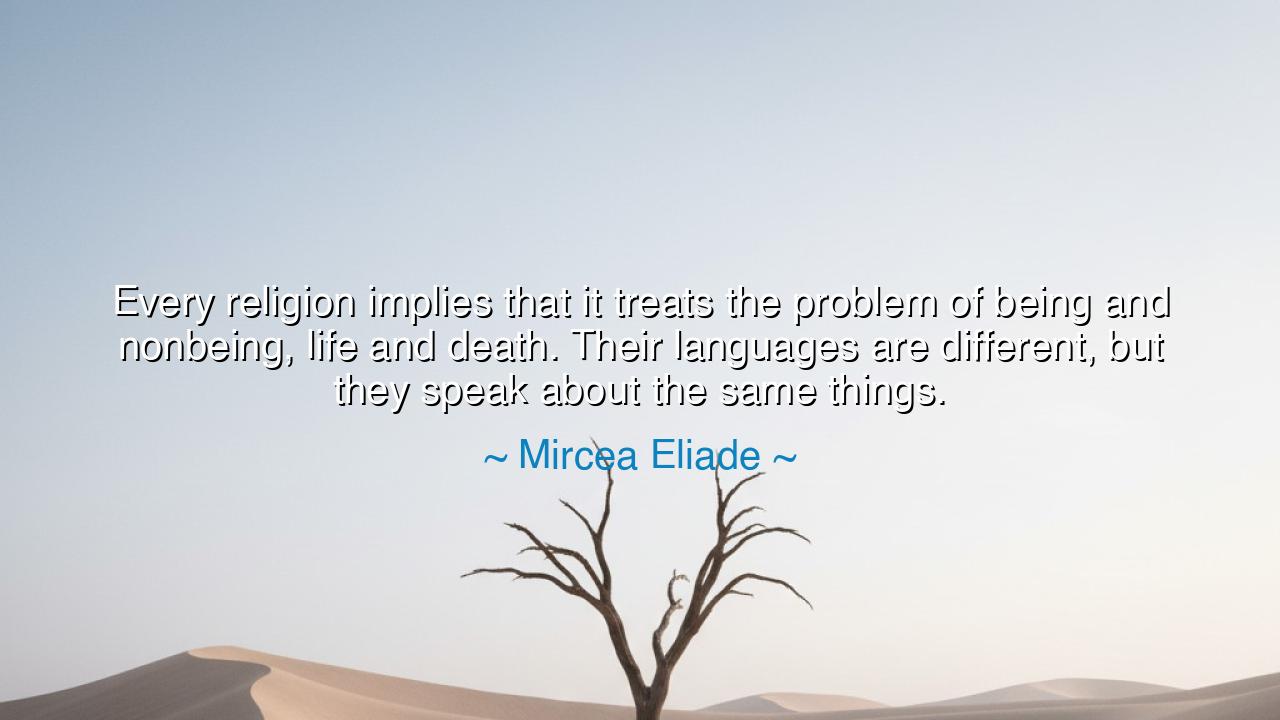
Every religion implies that it treats the problem of being and
Every religion implies that it treats the problem of being and nonbeing, life and death. Their languages are different, but they speak about the same things.






“Every religion implies that it treats the problem of being and nonbeing, life and death. Their languages are different, but they speak about the same things.” – Mircea Eliade
In the dawn of time, before men carved symbols upon stone or sang hymns to the heavens, there stirred within every human heart a question—what is Being, and what is Nonbeing? From this question was born the sacred yearning that would one day blossom into religion. Mircea Eliade, the sage of comparative myths, knew that behind the multitude of tongues, gods, and rituals lies a single trembling truth: all faiths are mirrors reflecting the same eternal light. Though their words differ—some calling it Brahman, others Yahweh, Tao, or Logos—they all kneel before the same mystery: the battle between life and death, existence and void, the mortal and the divine.
Every faith, whether of the ancient pyramids or the silent monasteries, seeks to reconcile man’s terror of nonbeing. The Egyptians, gazing at the eternal stars, wrapped their dead in linen and gold, believing the soul’s voyage would outlast the setting sun. The Buddha, in his great stillness beneath the Bodhi tree, sought to extinguish the illusion of self, to transcend the wheel of birth and decay. The Christian, gazing upon the Cross, saw in death not an ending but a passage to everlasting life. Each path, in its own sacred dialect, whispers of the same longing: that Being must not be lost, that from the ashes of the body, the spirit shall rise anew.
Consider the story of Gilgamesh, the ancient king who walked the earth before Abraham or Moses were born. He was mighty, yet haunted by the death of his friend Enkidu. In grief, he sought the secret of immortality, journeying through the mountains, across the seas, even to the ends of the world. But when he found the flower of eternal life, it was stolen by a serpent, leaving him to face his own mortality. In this tale, the cry of humankind is heard: the same cry that echoes in temples and mosques, in chants and prayers—the yearning to overcome nonbeing, to find meaning in the fleeting.
Eliade’s wisdom reminds us that the sacred is not divided by language or ritual. The Hindu priest who lights the lamp at dusk and the Sufi mystic who spins in divine ecstasy are both answering the same ancient call—to bridge the chasm between the finite and the infinite. For what is religion, if not the human heart’s rebellion against the silence of the grave? Every faith, in its own mythic form, is an act of defiance against meaninglessness—a declaration that life is more than matter, that death is not the end, but transformation.
To see this unity is to see with the eyes of the soul. It is to understand that the sacred tongue is not Hebrew, Sanskrit, or Latin, but the language of longing—the cry of Being itself. The wise do not mock another’s faith; they listen for the rhythm beneath the words, the eternal pulse that binds all creation. When the ancient Greeks spoke of the soul’s return, when the Daoists spoke of harmony, when the Navajo sang of balance between earth and sky—they were all tuning their hearts to the same cosmic music.
O children of the future, remember this teaching: diversity of religion is not division, but harmony misunderstood. Do not seek the superiority of one path over another, but the golden thread that runs through them all. As rivers merge into the sea, so do all sacred traditions merge into the ocean of truth. Let your faith not make you proud, but humble; for the more deeply you drink of your own well, the more clearly you will see the reflection of others in its waters.
The lesson is thus: learn to see beyond the form, and seek the essence. Let the differences of creed and custom not blind you to the shared human quest for meaning. Pray, meditate, serve, love—whatever form your devotion takes, let it be guided by reverence for Being itself. In your daily life, practice silence as the monks do; act with compassion as the saints do; and face death not with fear, but with awe, as the sages have done since time immemorial. For to live with awareness of Being is to stand at the heart of all religions, where all voices, ancient and modern, converge into one great hymn of existence.






AAdministratorAdministrator
Welcome, honored guests. Please leave a comment, we will respond soon